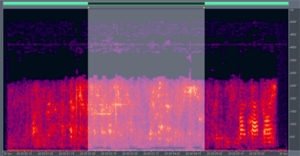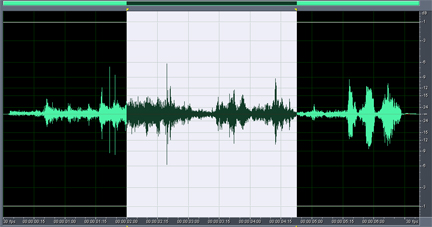by Tom Butler
Scope
Many of the articles on this website address the who, what, how and why of trans-etheric influences, including EVP and ITC, but they are mostly concerned with well-documented characteristics. For instance, see Characteristic Test for EVP. This article includes questions, observations and ideas about how phenomena are formed that are not commonly considered. It will be expanded as new characteristics suggest themselves. It is for the community to help decide if they deserve to be considered “common.”
EVP formation as frequency selection or amplitude selection.
Most transform EVP are thought to be formed by transforming available audio-frequency energy into voice. However, in some cases, the waveform representing ambient sound may be used to form the voice. If this is true, then the resulting display might be more like a “talking guitar” than to human voice pattern.
In this example recorded within Hoover Damn, the concrete room echoes the tourist’s excited voices. For comparison, Lisa’s voice can be heard at the end of the recording. The formants in her voice are clearly shown in the spectrograph view. The waveform view clearly represents the sound level of the crowd. Between 2 and 4.2 seconds, there is a whining voice that says something like “I’m down here” or “I’m Von Breal.” The “I’m” extends between 2 and 3.1 seconds. All of the utterance is above 1300Hz.
In truth, I have no idea what it says, which should cause concern that it may not be phenomenal. It is presented here as a possible exception to the rule of transform EVP being formed by opportunistically using available frequency and amplitude. If this is the opportunistic us of sound amplitude, then it may indicate a theory for voice formation other than stochastic amplification.
Possible amplitude modulation EVP example


Trance Entrainment
Robert Monroe designed his entrainment exercises around levels referred to as “Focus” (See The Monroe Way) where Focus 10 is: The first stage in separation of mind-consciousness from physical reality.” he used sound to entrain the listener’s mind and lead it into ever deeper levels of awareness.
After sitting with several physical mediums, I have noticed that a similar process appears to be active in the way mediums enter the necessary levels of awareness to produce phenomena. For instance, Hoyt Robinette demonstrates blind readings of what is written on paper for about an hour just before producing phenomena.
Virtually all of the physical mediums I have witnessed follow essentially the same pattern of introducing a series of etheric speaker, each with a unique specialty such as moving objects, gatekeeper and reunions. In some cases, the communicating entity will wake up the medium to experience the phenomena along with the sitters. The medium is alert right away, and afterwards, the medium quickly returns to deep trance. This is a relatively short cycle of wakening and return to trance, yet when brought back at the end of the session, the medium takes many moments to shake off the grogginess of trance.
There appears to be a relationship between the procession of etheric visitors and the mediums depth of trance. In the same way, Robinette routine may be a form of entrainment used to induce the needed state of awareness. This is an important point which may help explain why mediums are so bound by routine. If this is the case, then it is no wonder that a séance conducted in 2000 might look very similar to one conducted by the same medium in 2011.
![]()

I had a strange experience today. I was calling a friend of mine using a bluetooth headset and an iPhone 6S. I was getting ready to walk in the woods while I talked with her so I was sort of away from houses and other wifi signals. I dialed her number and the phone indicated it was connected to my friend’s number on the face of the phone. To my surprise, a male voice came through very clearly but it was slowed down so much I couldn’t tell what it was saying. It didn’t scare me exactly but it was very startling. I never could understand what he was saying. Because it was slowed down and a low voice, some might label it “demonic”. It would sound like that in the movies. I didn’t get that feeling but I did get that he was talking to me and trying to say something specific. After about 15 or 20 seconds of trying to figure out what he was saying, I clicked the call off and it went away. What do you make of that? I don’t try to communicate with the dead although sometimes they contact me through my research as a historical doc filmmaker.
Christi, First, some of the best “I love you” EVP have sounded demonic because of the kind of noise they were mixed with. We frankly see no evidence for demons, but we do occasionally see people behaving badly. No reason to fear … kind of funny most of the time.
We do not know enough about the kinds of naturally occurring artifacts produced with cell phones. When I worked in the analog world of the 1960s telephone systems, we would pass your experience off as crosstalk, but crosstalk is hard to produce in the digital world. Since we do not know, we depend on trends … do we have other, similar examples? Right now, maybe not, but it is worth keeping an eye out for others. One thing, were you near a strong radio broadcast antenna?
Another factor to consider is the implication of how we think EVP are processed into the physical. I explain it better in “Your Immortal Self,” but you can get the idea from the “How We Think” essay at http://ethericstudies.org/how-we-think/. The idea is that we as the person working with the equipment or an interested observer, are necessary as the channel through which the information is introduced to the physical. If that is correct, then the feeling you have about the message are important to consider. If you feel like it is paranormal, then perhaps it is. You are the one who must make that call.
Careful though. Look again at the essay. If you think you live in a fearful world, then that is part of your worldview. Worldview colors all of our experiences, so be aware that how you feel about the experience must be measured by what you have been taught. Have you learned to manage your worldview? Few of us have.